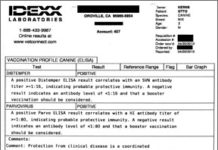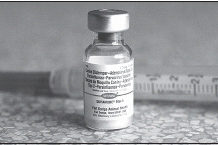Beware of Over-Vaccinating Your Dog
In Whole Dog Journal's opinion, annual vaccination for most canine diseases is unnecessary and potentially harmful. Dog owners should avoid employing those old-fashioned veterinarians who recommend annual vaccines. Owners should also avoid those veterinary service providers who provide inexpensive vaccines and other routine care without the benefit of a relationship with you and your dog beyond a brief transaction in a parking lot or pet supply store.
Shots Fired: Professional veterinary associations call for a reduced canine vaccination protocol
In the past decade, the veterinary profession’s overall attitude toward vaccination has evolved to a point that can be tentatively termed progressive. In 2002, the American Veterinary Medical Association issued a policy statement that urged veterinarians to “customize” vaccine protocols for individual patients, since there is “inadequate data to scientifically determine a single best protocol” for initial or repeat vaccinations. A year later, the prestigious American Animal Hospital Association (AAHA) released its landmark canine vaccination guidelines, which were updated in 2006.
Bad News for Dog Owners Looking for Single-Antigen Vaccines
I have always run titers on my dogs before vaccinating and my vet provided individual doses when required. This year was different. The office manager called and said their practice could no longer provide individual vaccines, as in the past. I vaccinate only for parvo, distemper when titers are low, and rabies. I was quite upset because one of my dogs needed only distemper and my other dog’s titers were good. I posed the question, “Why offer titers, if you are not able to provide individual vaccines? Big silence! Well, I know the answer.
Vaccination and Canine Distemper Virus (CDV)
When we decided not to vaccinate Caleb, our Bouvier des Flandres, against anything other than rabies, my friend Janice and I knew we ran a risk that he might develop a dreaded disease. We also knew that vaccination doesn't always protect against disease, and believed it sometimes causes illness. We felt the home-prepared BARF (bones and raw foods) diet we fed him would help his body fight off many health problems. Naturally, we hoped that Caleb would never come down with anything serious like canine distemper virus (CDV). But, when he was three years old, we had to face and overcome exactly that challenge.
Take the Titer Test before Administering Vaccinations
Now more than ever, vaccine titer tests are readily available, not terribly expensive, and offer multiple advantages over the practices (intentional or not) of over-vaccination and under-vaccination. Few issues in veterinary medicine are as controversial as the debate about administering annual vaccinations to our dogs. Long considered part of the standard of baseline, responsible veterinary healthcare, and credited with conquering some of the fiercest canine viral and other infectious diseases, vaccinations now are also suspected of creating vulnerability to illnesses and chronic conditions such as anemia, arthritis, seizures, allergies, gastrointestinal and thyroid disorders, and cancer.
Holistic Veterinarians Take on The Annual Vaccination Schedule
Holistic veterinarians have long decried the annual vaccination schedule recommended by many conventionally trained veterinarians for all dogs. Many holistic veterinarians suspect that many of the complex ailments that plague our modern dogs – from allergies to digestive problems to aggressive behavior and so on – have their roots in immune system problems brought on by excessive and unnecessary vaccination. However, many of us are convinced by our veterinarians that our dogs won’t be safe unless they receive these boosters every year. Fortunately, a recent study indicates that most dogs retain humoral antibody protection from past vaccinations for longer than previously thought.
Leptospirosis in Dogs
Dogs with leptospirosis will have a decreased appetite, fever, and low energy level. Prevention through the use of the leptospirosis vaccine is important to ensure your dogs health.
What Is Distemper in Dogs?
Distemper in dogs is caused by paramyxovirus which attacks the respiratory, gastrointestinal, and nervous system. It is spread by sneezing, and shared food and water bowls.
Understanding Canine Vaccinations
Most dog owners are responsible and understand the importance of protecting their companions from preventable disease. That’s surely what motivated the dozens of people I observed standing in a long line with their dogs and puppies at a low-cost vaccination clinic offered in a local pet supply store.
Rolled-Up Welcome Mat?
No good deed goes unpunished. That’s what Pam Rowley of Upper Brookville, New York, discovered last November, when the hospital administrator who always greeted her and 8-year-old Vizsla Gunner at the start of their monthly therapy-dog visits quietly took her aside to deliver some bad news.
Puppy Shots – Understand Vaccinations
Modern-day dog owners enjoy the comforting certainty that their puppies can and will be given a series of vaccinations, so-called “puppy shots,” to protect them from life-threatening canine diseases such as distemper, parvovirus, and rabies. Most of us were indoctrinated in early childhood to schlep Shep to the vet once a year for his annual booster shots in order to extend that vital protection year after year. We accepted without question that a failure to do so was the height of dog owner irresponsibility.
Can Dogs Get Tetanus?
Fortunately, tetanus is relatively rare in dogs. Horses and humans are more susceptible to tetanus, while cats are highly resistant. Dogs fall somewhere in the middle of this spectrum but it does happen. As an emergency veterinarian, I have personally seen two cases of tetanus in dogs and read of several others.















